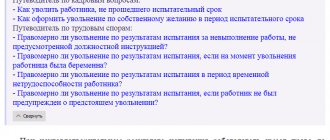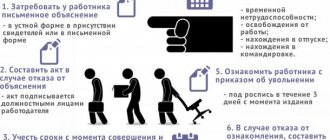Home / Labor Law / Dismissal and layoffs / Dismissal
Back
Published: 04/25/2016
Reading time: 10 min
0
808
The employer is one of the main parties to the labor relationship, so he also has certain rights. In particular, these include the right to demand from the employee the conscientious performance of existing duties .
Otherwise, he has compelling reasons to dismiss the employee, even if the employment contract concluded with him has not expired. It is worth considering these grounds in more detail, as well as the procedure for carrying out the dismissal procedure.
- Grounds for dismissal
- Situations in which dismissal is unacceptable Minor employees
- Pregnant women
- Employees who have family obligations
General grounds
A detailed list of grounds for dismissal, in the presence of which the employer has the right to terminate the employment contract with the employee, is set out in Art. 81 Labor Code of the Russian Federation.
The list includes such grounds for dismissal as:
- termination of the existence of an organization or individual entrepreneur (clause 1, part 1, article 81 of the Labor Code of the Russian Federation);
- the need to reduce the number of employees or staff (clause 2, part 1, article 81 of the Labor Code of the Russian Federation);
- inconsistency of personnel with their positions due to insufficient qualifications, in accordance with data confirmed by certification (clause 3, part 1, article 81 of the Labor Code of the Russian Federation);
- change in the owner of the enterprise’s property (clause 4, part 1, article 81 of the Labor Code of the Russian Federation);
- repeated failure by an employee to perform the functions of his position, subject to a disciplinary sanction (clause 5, part 1, article 81 of the Labor Code of the Russian Federation);
- a gross one-time violation by an employee of the established duties of the position (clause 6, part 1, article 81 of the Labor Code of the Russian Federation);
- guilty actions of an employee servicing monetary or commercial valuables, provided there are grounds for loss of trust (clause 7, part 1, article 81 of the Labor Code of the Russian Federation);
- commission of an act of an immoral nature by an employee with the functionality of a teacher (clause 8, part 1, article 81 of the Labor Code of the Russian Federation);
- an unjustified decision of the head of the institution, which caused the loss of property, violation of integrity (clause 9, part 1, article 81 of the Labor Code of the Russian Federation);
- gross one-time violation by a manager, his deputy, or an employee of the established duties of the position (clause 10, part 1, article 81 of the Labor Code of the Russian Federation);
- submission by an employee to the employer of fictitious documents in the process of drawing up an employment agreement (clause 11, part 1, article 81 of the Labor Code of the Russian Federation).
The employer may try to dismiss an employee without the latter's fault on his own initiative. However, this process is lengthy and complex; in some cases, the employer will be forced to pay compensation. It is easier to terminate an employment contract at the initiative of the employer if an employee commits a gross violation of labor discipline.
Dismissal upon termination of the branch's activities
Due to the closure of a separate division, the employee was offered a transfer. The employee did not respond to the proposal and was fired under clause 9, part 1, art. 77 of the Labor Code of the Russian Federation - refusal to transfer to work in another area together with the employer. The plaintiff demands to change the wording of the grounds for dismissal to clause 1, part 1, art. 81 of the Labor Code of the Russian Federation - liquidation of an organization.
The RF Armed Forces voiced the following position:
- place of work is a mandatory condition included in the employment contract (Part 2 of Article 57 of the Labor Code of the Russian Federation);
- upon termination of the activities of a separate division, labor relations are terminated according to the rules provided for in the event of liquidation of the employer (part 4 of article 81 of the Labor Code of the Russian Federation);
- in paragraph 60 of the Resolution of the Plenum of the Armed Forces of the Russian Federation dated March 17, 2004 No. 2, it is explained that an employee dismissed illegally or in violation of the dismissal procedure is reinstated at work or, in the event of liquidation, he is paid the average salary for the entire period of forced absence.
Conclusion: the closure of a branch presupposes the liquidation of the employer in a given area, therefore employees are fired in this case in connection with the liquidation of the organization (Determination of the Judicial Collegium for Civil Cases of the Armed Forces of the Russian Federation dated June 17, 2019 No. 83-KG19-1).
Gross violation of discipline
What must an employee do in order to be dismissed at the initiative of the employer?
The legislation allows for the imposition of disciplinary sanctions, the most severe of which is the dismissal of an employee at the initiative of the employer (clauses 5-8, 10, 11 of Article 81 of the Labor Code of the Russian Federation).
The Labor Code of the Russian Federation allows dismissal at the initiative of the employer for committing a gross disciplinary offense (clause 6 of Article 81 of the Labor Code of the Russian Federation), which include:
- absenteeism (without a valid reason for more than 4 hours in a row);
- state of intoxication confirmed by medical examination;
- disclosure of state or commercial secrets established in court;
- material damage to the organization or third parties (theft, embezzlement), confirmed by the court;
- violation of labor protection rules with serious consequences;
- loss of trust in those working with valuables and money;
- immoral behavior of teaching staff;
- provision of false documents when applying for a job (Clause 11, Article 81 of the Labor Code of the Russian Federation).
The procedure for dismissal at the initiative of the employer in this case will be as follows.
- Identify the fact of violation and record it in a document (act, protocol, memo, examination conclusion, judicial act).
- Request explanations in writing, and if you refuse to give an explanation, draw up an act (Article 193 of the Labor Code of the Russian Federation).
- Make a decision on dismissal, issue an order, which is presented against signature, and in case of refusal - an act. Dismissal can be formalized by order using the unified form T-8 in accordance with Resolution of the State Statistics Committee of the Russian Federation dated January 5, 2004 No. 1 or in a form developed by the employer (Part 1, Article 84 of the Labor Code of the Russian Federation). Publication of the document according to clause 6. Part 1 of Art. 81 of the Labor Code of the Russian Federation is possible if:
- no more than one month has passed since the discovery of the offense (the period does not include being on sick leave or on vacation);
- no more than 6 months have passed since the offense (the period does not include the period of criminal proceedings).
- Make an entry about the dismissal in the work book.
- Make an entry about the dismissal in the employee’s personal card (unified form T-2) in connection with a one-time gross violation by the employee of work duties.
- On the day of dismissal, as a general rule, final payment is made for the time actually worked and compensation is paid for unused vacation.
Dismissal for violation of labor discipline is also possible, but if the violations are systematic and confirmed by officially imposed penalties.
Dismissal procedure
The provisions of the Labor Code oblige the employer to formalize dismissal in the prescribed manner (Labor Code of the Russian Federation, Article 84.1). If the question concerns dismissal on the initiative of the company’s management, then the general procedure for dismissal is as follows:
- management must have a basis (documented reason for the decision);
- the employer is obliged to warn the employee about the upcoming termination of the contractual relationship by an official order specifying the basis;
- familiarization with the document must be confirmed by the signature of the employee;
- the decision of the management must be reflected in the work book, and the entry must be accompanied by a link to the article of the Labor Code, which is the basis for dismissal;
- on the day of termination of the contract, it is necessary to provide the employee with personnel documents (mandatory for issuance are: a work book, a certificate of income for two years and a certificate of paid contributions to the Pension Fund);
- Also, on the day of dismissal, a full settlement must be made with the employee;
- The timing of notifying an employee of an upcoming dismissal depends on the type of employment contract and is mandatory for compliance.
Depending on the reason for dismissal, separate points are added to the procedure that the employer is obliged to fulfill.
Liquidation
If dismissal is due to the cessation of work of the entire enterprise, then the contracts with all employees are subject to termination. Selective dismissal of employees for this reason is unacceptable.
Stages of registration:
- Drawing up an order to stop the work of the organization.
- Notification of employees (personally, against signature);
- Notification of representatives of the trade union and the employment service (Labor Code of the Russian Federation p. 180) two months before the order enters into force.
- Registration of orders for dismissal of personnel.
- Calculation.
- Issuance of personnel documents.
If a mass layoff is imminent, the notice period increases to three months.
Reduction
If it is necessary to reduce the number of work positions, the employer must be guided by the rules relating to the registration of staff reductions. The procedure is identical to the stages carried out during the liquidation of a company, with one addition.
After issuing an order to reduce staff, the employer is obliged to consider the possibility of offering replacement positions for employees who were laid off. If the employee agrees to a new position, his transfer is formalized. If a vacant position does not appear before the day of dismissal, or the employee does not agree with the proposed working conditions, a dismissal order is issued, calculations are made and documents are issued.
It is important to remember that when dismissing employees under this article, as well as when liquidating an enterprise, the employer is obliged to pay them severance pay. Its size corresponds to two months' salary
"According to the article"
Dismissal “under article” leaves a certain negative imprint on the employee’s future work. For this reason, an employee often expresses a desire to formalize his dismissal on his own initiative. For the employer, this type of dismissal means additional responsibility. When deciding why an employee can be fired, he is obliged to prove the existing violations.
Violations
If an employee is subject to dismissal due to his behavior, disregard for the rules of conduct and safety, or refusal to perform his job, then the procedure for parting with such an employee is as follows:
- Management must draw up a report proving the incident occurred.
- Receiving written explanations from the perpetrator of the incident (Labor Code of the Russian Federation, Art. 193) within two days after the incident.
- Issuing an order and notifying the violator.
- Calculation.
- Issuance of “labor” and required certificates.
To ensure that the employee does not have a reason to defend his rights in court, every violation of labor discipline must be reflected in his file. Lateness, absenteeism, refusal to perform duties and other manifestations of a careless attitude towards work should be formalized in the form of reprimands, penalties, suspensions from work, etc.
When making a decision, it is important to remember that an employee’s violation of discipline may have a good reason. For example, absenteeism may turn out to be absence from work due to illness, confirmed by a certificate from a medical institution. In this case, dismissal under this article cannot be executed, since both the labor inspectorate and the court will side with the employee.
Despite the direct indication in the Labor Code of the possibility of dismissing a person for drunkenness, the employer will have to prove that the employee was drunk at the time of work. If a drunk employee finds himself at the workplace after a working day or outside of his shift, this cannot be a reason for dismissal.
"Guilty Acts"
The most peremptory type of dismissal is violations related to proven offenses that caused damage to the enterprise. In this case, the registration procedure is similar to dismissal for violations. The employee’s guilt is recorded in the act and confirmed by a court decision. Often, business owners do not bring the case to court, allowing the employee to leave “of his own free will,” since his illegal actions directly affect the company’s reputation.
The legislation also allows for the dismissal of employees with the wording “loss of trust.” Such a reason for dismissal may be related to the employee’s negligence or intentional actions that caused or could cause damage to the company’s activities.
It should be remembered that for this reason, you can only part with those employees who are officially assigned financial responsibility. Most often they are financial block employees, salespeople, logisticians and warehouse employees.
Lack of professional skills
When it comes to performance complaints, the employee evaluation steps must be followed for dismissal.
A trade union representative must be included in the certification commission. Only recorded unsatisfactory results can lead to dismissal. Before dismissing an employee, he should be given the opportunity to prove himself in an easier and less lucrative position, or to improve his qualification level within a specified time frame.
Procedure:
- Issuing an order for certification, notifying employees;
- Conducting assessment activities with the participation of trade union representatives;
- Notification of assessment results.
- Providing an alternative place of service that matches the employee’s qualifications. This item is not mandatory; its implementation depends on the management of the company.
- Drawing up an order for transfer or dismissal.
- Calculation.
- Issuance of personnel documents.
When dismissing an employee “under the article”, you should make sure that the facts of the employee’s non-compliance with the established standards are confirmed, and there are no valid reasons to justify them.
Multiple violations of discipline
The law also provided for the possibility of dismissing an employee who regularly violates labor discipline and does not plan to improve. In this case, you need to follow these steps:
- To establish the fact of violation of labor discipline - non-compliance must be recorded in an act or other document (Article 81 of the Labor Code of the Russian Federation).
- Demand an explanation from the culprit (Article 193 of the Labor Code of the Russian Federation). An offer to provide explanations must be made in writing; if the person is absent, it must be sent by mail.
- To identify the presence of an outstanding reprimand or reprimand - no more than a year should pass from the moment of involvement in the first case (Articles 81, 194 of the Labor Code of the Russian Federation).
- Make sure there are no valid reasons for violation of discipline. For example: if you are absent from work, you need to make sure that the employee did not donate blood, did not get into an accident, does not have a court summons, etc. Determine whether the woman is pregnant (Article 81, Article 261 of the Labor Code of the Russian Federation) .
- Issue an order (Article 84.1 of the Labor Code of the Russian Federation), familiarize the perpetrator with it against his signature, or draw up an act (Article 193 of the Labor Code of the Russian Federation).
- Make an entry in the work book.
- Issue final payment and work book on the day of dismissal. Here, if an employee causes material damage to the enterprise, resolve the issue of compensation (Articles 232, 238 of the Labor Code of the Russian Federation).
IMPORTANT!
I draw your attention to the fact that the duties for which a person is involved must be established by an employment contract, internal labor regulations, job descriptions, technical rules (and the contract must contain a reference to the last two).
Dismissal due to professional unsuitability
Sometimes it becomes necessary to part with an employee who cannot cope with his professional responsibilities. This fact is confirmed by assessing working personnel using certification. The commission created for certification must necessarily include representatives of trade union bodies.
An employee can be dismissed only if the certification shows that the employee is not suitable for the position held. In this case, he must first be offered, if possible, another job that he can cope with. He may also be given a deadline to improve his qualifications.
During the probationary period
It is possible to dismiss an employee at the initiative of the employer during a probationary period due to Part 1 of Art. 71 of the Labor Code of the Russian Federation, if the test result is unsatisfactory.
To make it easier in the future to prove a person’s insolvency as an employee, upon hiring it is necessary to draw up a list of tasks and specific requirements that must be fulfilled. To successfully complete these tasks, you must solve them.
During the probationary period, the employee can be dismissed at any time at the initiative of the employer, while confirming the inadequacy of the position held.
To do this, it is necessary to document every fact of non-fulfillment of assigned tasks. And in the event of a conflict situation, the organization will be able to use these documents to prove the incompetence of the dismissed person.
It can be:
- acts on defective products;
- reports and memos from immediate supervisors and colleagues about the poor performance of their duties by the subject;
- protocols of the commission based on the results of passing the test period;
- reports from the subject on the results of his activities;
- orders for disciplinary action during the probationary period.
An important point is a written notification 3 days before the end of the term indicating the reasons for termination of the contract at the initiative of the employer.
It takes into account the following nuances:
- form - written only;
- deadline - no later than 3 days before the end of the term;
- the reason is an unsuccessful result, a negative assessment of the work by management.
Please note that the contract should have reflected the test clause. If it is not there, the employee is considered accepted without testing (Article 70 of the Labor Code of the Russian Federation).
If the warning period is not met and the person continues to work after the expiration of the period, he is considered to have passed the test.
Situations in which dismissal is unacceptable
Some employees are classified in a separate category in labor legislation, so the general rules regarding disciplinary action do not apply to them. The same applies to such a measure as the dismissal of an employee on the initiative of the manager. It cannot be applied to the categories described below.
Minor employees
To do this, appropriate permission must be obtained from the following structures:
- Commission on Juvenile Affairs;
- state labor inspectorate.
In relation to this category, dismissal is also permissible in the event of liquidation of the enterprise or termination of the activities of the individual entrepreneur.
Pregnant women
In this case, in relation to pregnant women, the only exceptions are those cases in which the employer legally ceases to operate.
Employees who have family obligations
These include the following categories of citizens:
- have a small child (under three years old);
- are the parent and sole breadwinner in a family where there is a disabled child under 18 years of age;
- citizens who alone are raising a child under 14 years of age or a disabled minor (this could be a mother, father, guardian or other close relative).
It is also not allowed to dismiss an employee while he is on vacation or sick.
Even if there are compelling reasons, this can only be done after the end of one of these periods.
For circumstances beyond the control of the employee or employer
In such cases, according to Art. 83 of the Labor Code of the Russian Federation, include:
- military conscription (the key fact is that the person has received a document confirming the conscription);
- reinstatement of the former employee by decision of the court or the state labor inspectorate (before dismissal, the person must be offered all available vacancies in the area; if the transfer is refused, the person is fired);
- non-election to a position (applies to those with whom an agreement was concluded in connection with election to a position for a certain period (including based on the results of a competition);
- imprisonment by court verdict;
- disability for medical reasons;
- death or recognition as missing (if an individual entrepreneur terminates his activities due to death, the day of termination of employment relations is the day of death of the entrepreneur. The basis is the death of the employer, payments are made at the expense of his property and inheritance by court decision. The death of an employee must be confirmed by an official document, the amount payments and work book are issued to close relatives);
- emergency circumstances;
- administrative punishment (disqualification, ban on holding certain positions);
- expiration of the contract, suspension for a period of more than 2 months;
- denial of access to state secrets, if necessary;
- cancellation of the decision on reinstatement.
Severance pay for the listed reasons is paid only to those called up for military or alternative service, persons recognized as disabled, and persons dismissed due to the reinstatement of those previously dismissed. The amounts are calculated from the average salary for the previous two years of work, recalculated for two weeks.
The procedure for terminating an employment contract at the initiative of the employer is the same as in the usual manner, and involves the issuance of an order, familiarization with it, issuance of a work book and final payment.
In all cases, the order and work book reflect the corresponding paragraph of Art. 83 Labor Code of the Russian Federation.
Dismissal due to staff reduction
The basis for such dismissal is clause 2, part 1, art. 81 Labor Code of the Russian Federation.
Employees are notified of upcoming dismissal due to reduction 2 months before the expected date of termination of the employment contract (Article 180 of the Labor Code of the Russian Federation). For seasonal workers, this period is reduced to 7 calendar days (Article 296 of the Labor Code of the Russian Federation).
From the moment of notification and until the day of termination of the employment relationship, the employer is obliged to offer available vacancies to laid-off employees:
- relevant qualifications of workers;
- lower positions;
- lower paid job.
Dismissed employees have repeatedly gone to court, believing that they were laid off in violation of the established procedure. Some of the cases were considered by the Supreme Court of the Russian Federation, which made conclusions (clauses 3, 4 of the Review of Practice):
| Solution | Determination of the Judicial Collegium for Civil Cases of the Armed Forces of the Russian Federation dated September 14, 2020 No. 53-KG20-4-K8 | Determination of the Judicial Collegium for Civil Cases of the Armed Forces of the Russian Federation dated January 20, 2020 No. 5-KG19-217 |
| The crux of the matter | The employee does not recognize his layoff as legal, because vacant positions were offered to other laid-off employees, but not to him | The employee does not recognize his layoff as legal because he was not offered a vacancy in a branch of the organization in the same area |
| Employer's position | The employer did not offer vacant positions because other laid-off employees who filled them were first notified about them | The employer had no vacancies in the branch where the employee was registered, so layoffs followed |
| Position of the RF Armed Forces | Art. 2 and art. 3 of the Labor Code of the Russian Federation establishes equality of rights and opportunities for workers and prohibits discrimination in the world of work. According to Art. 180 of the Labor Code of the Russian Federation, the employer is obliged to offer the laid-off employee vacancies available from the moment of notification of the upcoming layoff until the day of dismissal. Therefore, dismissal due to reduction is allowed only if the employee refuses the offered vacancies | According to paragraph 2 of Art. 55 of the Civil Code of the Russian Federation, a branch is a separate division of a legal entity located outside its location. Part 3 art. 81 of the Labor Code of the Russian Federation obliges the employer to offer vacancies to laid-off employees in a given locality, and, if there are appropriate conditions in a collective or labor contract, agreements, in other localities (outside the administrative-territorial boundaries of the relevant locality). The employer was obliged to offer the employee vacant positions in all departments of the city |
| Conclusion | Management does not have the right to decide who is offered vacancies and who is not. Vacant positions must be offered to every redundant employee. It is necessary to select an employee for a position if there are several applicants, taking into account the advantage in leaving the job, as well as the chronology of obtaining consent to fill vacant positions | Management is obliged to offer the redundant employee available positions in all branches and separate divisions in the area in which the employee worked |









